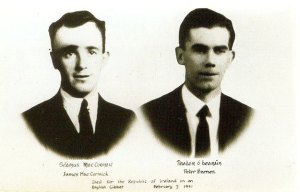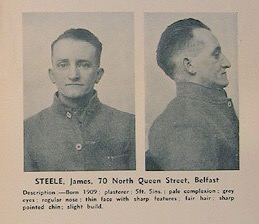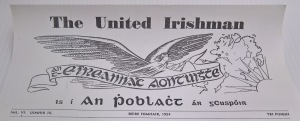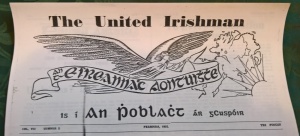ON THIS DATE (7TH FEBRUARY) 78 YEARS AGO - WESTMINSTER EXECUTES TWO IRA VOLUNTEERS.
James McCormack (aka 'James Richards') was born in Mullingar in County Westmeath in 1910, and he joined a unit of the IRA in Tullamore, County Offaly, the same county where his comrade, Peter Barnes, was born - in the town of Banagher, in 1907.
'I have the honour to inform you that the Government of the Irish Republic [32 counties], having as its first duty towards its people the establishment and maintenance of peace and order here, demand the withdrawal of all British armed forces stationed in Ireland. The occupation of our territory by troops of another nation and the persistent subvention here of activities directly against the expressed national will and in the interests of a foreign power, prevent the expansion and development of our institution in consonance with our social needs and purposes, and must cease. The Government of the Irish Republic believe that a period of four days is sufficient notice for your Government to signify its intentions in the matter of the military evacuation and for the issue of your Declaration of Abdication in respect of our country. Our Government reserves the right of appropriate action without further notice if upon the expiration of this period of grace, these conditions remain unfulfilled...' - IRA ultimatum to the British Foreign Secretary, Lord Halifax, 12th January, 1939.
Thirteen days later - on Friday, the 25th August (a few days before Hitler's German army invaded Poland) - an IRA man from Cork, Joby O'Sullivan, was strolling through Broadgate, in Coventry, wheeling a push bike, on his way to a police station. The bike repeatedly got stuck in tram tracks on the road and, frustrated, he removed it from the road and propped it up against a wall. The bike had an armed bomb in the basket that was fixed to the handlebars, which had been wired up to an alarm clock timer, which was set for about 2.30pm. He left it there, and walked away. The five-pound bomb exploded prematurely, killing five people and injuring dozens more - it was one of about 150 IRA bombing incidents in England at that time, targeting infrastructure such as electricity stations, post offices, gas stations and government buildings.
Not long after the explosion, Peter Barnes (who was in London on the day of the explosion)
was arrested at the lodgings he was staying in and, three days after that, James McCormack (aka 'James Richards') was pulled-in along with the other tenants of the house he was staying in. The 'trial' began in December (1939) and both men were convicted and sentenced to death by hanging. Throughout the court case, James McCormack remained silent until he told the court - "As a soldier of the Irish Republican Army, I am not afraid to die, for I am dying in a just cause."
Peter Barnes stated to the court - "I would like to say as I am going before my God, as I am condemned to death, I am innocent, and later I am sure it will all come out that I had neither hand, act or part in it. That is all I have to say." In his last letter (to his brother) he wrote - 'If some news does not come in the next few hours all is over. The priest is not long gone out, so I am reconciled to what God knows best. There will be a Mass said for us in the morning before we go to our death. Thank God I have nothing to be afraid of. I am an innocent man and, as I have said before, it will be known yet that I am.'
In the last letter he ever wrote, James McCormack said - "This is my farewell letter, as I have been just told I have to die in the morning. As I know I am dying for a just cause, I shall walk out tomorrow smiling, as I shall be thinking of God and of the good men who went before me for the same cause." (That letter was addressed to his sister, as both of his parents were dead.)
In Winson Green Prison, Birmingham, at 8.50am on Wednesday, 7th February 1940 - 78 years ago on this date - the two men received a final blessing. Minutes later they walked together to the scaffold and were hanged by four executioners.(Two short videos here and here, in relation to those two men, and a few paragraphs re Jimmy Steele...)
One of the few Irish republicans to be charged by Westminster with "treason felony" (an archaic charge originally devised for John Mitchel, the Young Ireland leader, in 1848) Jimmy Steele, who was born in Belfast on the 8th August, 1907, lived his life as a soldier, writer and poet, and devoted his 63 years in this world to the Republican Movement and the cause of Irish freedom.
At the age of 12, he joined Na Fianna Éireann and was active with his young comrades in assisting the Volunteers in his own area, the New Lodge Road, during the Tan War. Following the Treaty of Surrender in December 1921, and the split in the Movement, Steele remained true to his republican principles and, in the early 1920's, he joined the IRA. Arrested twice - in 1923 and 1924 - he was held for several months in Crumlin Road Jail. Following his release later that year and the freeing of the internees in 1925, he assisted with the re-organising of the IRA and NFÉ in Belfast. On the 25th April 1936, while attending an IRA court-martial in connection with the abortive Campbell College raid in December 1935, at the rooms of the Craobh Rua Club at Crown Entry in Belfast, Steele and most of the Belfast Battalion Staff were 'arrested' by British forces. On the 29th May 1936, he was charged with 'treason felony' and, along with twelve others, was found guilty and sentenced to five years penal servitude in Crumlin Road Jail.
Released in May 1940, he reported back to the Army leadership and continued on as before. While 'on the run', he married Anna Crawford, a member of Cumann na mBan who came from a staunch republican family ; unfortunately, married life in freedom was to be short-lived - the following December he was re-arrested and sentenced to ten years in jail. In January 1943, along with Patrick Donnelly, Ned Maguire and Hugh McAteer, Steele escaped from Crumlin Road Jail. Despite a reward of £3000 being offered by the Stormont administration for his capture and his photograph being displayed throughout the Six Counties, he reported back for active service and was appointed Adjutant of the Northern Command Staff IRA.
He figured in two major operations during his brief period of freedom : in March 1943, along with Liam Burke and Harry White, he organised and assisted in the escape of 22 IRA Volunteers from Derry Jail and, in April 1943, he participated in the Broadway Cinema operation on the Falls Road when armed Volunteers took over the cinema and stopped the film while Steele and McAteer went on stage and read a statement from the IRA Army Council. The two men finished off the nights entertainment for the packed cinema by reading the 1916 Proclamation!
By May 1943, Steele was back in jail, this time sentenced to twelve years. When he was released in September 1950, he was the last republican prisoner of that era to be freed, leaving Crumlin Road Jail empty of political prisoners for the first time since partition. During the following years, Steele edited two Belfast newspapers - 'Glor Uladh' and ' Resurgent Ulster', and was the main author of two books published by the National Graves Association - 'Antrim's Patriot Dead' and 'Belfast Patriot Graves'. On the 21st December 1957, following the beginning of the IRA's Border Campaign, internment was once more introduced in the Six Counties and Steele was among the 167 republicans interned in Crumlin Road Jail - he was released three years later and reported back to the IRA. He was an outspoken opponent of the policies being pursued by the leadership of the Republican Movement and, in an oration at the re-interment of the remains of Peter Barnes and James McCormick at Mullingar, County Westmeath, in July 1969, he severely criticised the leadership and in particular the running-down of the IRA.
Within six months (January 1970) the inevitable split in the Republican Movement occurred and, following 'the parting of the ways' Jimmy Steele, a member of the IRA's Belfast Brigade Staff and the Provisional Army Executive (a position he held until his death) was active in Belfast re-organising and re-arming IRA units to defend nationalist areas from attack by Orange mobs backed-up by the B-Specials and RUC. A founder member of ' Republican News' in June 1970, the four-page weekly paper under the editorship of Steele soon had a circulation of 15,000 copies per week. Jimmy Steele was Editor of that 'paper when he died on the 9th August, 1970, at 63 years of age : more than twenty of those 63 years were spent in jail. Steele by name, and Steele by nature - hard to break.
'SINN FÉIN SOCIAL AND ECONOMIC PROGRAMME...'
From 'The United Irishman' newspaper, October 1954.
The foregoing particulars are given merely as a rough outline of the drain imposed upon the economy of the Irish Nation through the business operations of foreign insurance and assurance companies. While such companies are permitted to function within the shores of Ireland, this drain on the resources of the Nation and the savings of its people will remain and, if present trends may be taken as correctly indicating what the future holds, not alone will this drain continue at present levels but will continue to expand to the further detriment of the Irish economy.
It is the aim of Sinn Féin to have legislation enacted by the National Government whereby, after a given date, foreign insurance and assurance companies shall be debarred from transacting 'new business' within Ireland and existing business to be liquidated thereafter as and when policies already in force reach maturity.
If, after an acturial computation of the financial issues involved, other means of a nature more beneficial to the Irish people can be devolved to terminate more rapidly the business transactions of the foreign companies, then such means should be adopted. (END of 'SINN FÉIN SOCIAL AND ECONOMIC PROGRAMME' : next - 'SINN FÉIN IS EVERYTHING ITS NAME IMPLIES - GOVERNMENT OF THE PEOPLE, BY THE PEOPLE, FOR THE PEOPLE!' , from the same source.)
"TO EVERY GENERATION ITS DEED..."
From 'The United Irishman' newspaper, February 1955.
Padraig Pearse defined "Ireland one and Ireland free" - is not this the definition of 'Ireland a Nation'? Irish nationalists are those "who accept the ideal of, and work for, the realisation of an Irish nation, by whatever means?" Justifiable means, of course. These definitions are embarrassing nowadays to those who honour the man yet reject the teaching that made the man ('1169' comment - such as those in the Leinster House institution, for example).
Pearse expressed his opinion on the use of force - "A thing that stands demonstrable is that nationhood is not achieved otherwise than in arms : in one or two instances there may have been no actual bloodshed but the arms were there and the ability to use them. Ireland unarmed will attain just as much freedom as is convenient for England to give her ; Ireland armed will attain ultimately just as much freedom as she wants."
And, if bloodshed is horrible - "The nation which regards it as the final horror has lost its manhood. There are many things more horrible than bloodshed ; and slavery is one of them." Another is national extinction.
Those of us who are realists must admit that national extinction is a definite possibility. The signs are there - we see a static ageing population, a decline in Gaelic culture (at least in so far as it interests the majority of our people), too little progress in agriculture and too much foreign influence in industry. Through the influence of the wireless, the cinema and television, the atmosphere has become something which is foreign to our culture, and stronger than it... (MORE LATER.)
GROWING UP IN LONG KESH...
SIN SCÉAL EILE.
By Jim McCann (Jean's son). For Alex Crowe, RIP - "No Probablum". Glandore Publishing, 1999.
The abuse coming from the 'enemy' who were looking on was deafening - they were gloating at us, laughing and calling us every name under the sun. "Don't take them under your notice, boys.." shouted Bloggs Long, "..we play them (Cage Ten) next and we'll fix them, no problem!"
The scenes on the football pitch reminded me of some John Ford western - it all looked totally choreographed. I can honestly say that I didn't see anyone getting hurt. Embarrassed? Yes. Hurt? No. Just loads of John Wayne's fighting loads of Victor McLaglen's, and I noticed a few Maureen O'Hara's fighting a few Bette Davises as well! I looked at my comrades 'playing football', and it was frightening. I was beginning to feel sorry for them (Cage Nine) when Danny D hit me a slap on the back of the head and said "Stop feeling sorry for them and get stuck into one of them..."
The fighting was starting to concern both the Cage Staffs, especially when it started affecting comrades like J. Allsopp, who was normally a quiet spoken, mild mannered friend from Belfast - he threw that which was called 'a wobbler' (a mad fit) and had to be subdued by players from both teams who cut short their own wobblers to take care of him... (MORE LATER).
ON THIS DAY NEXT WEEK (WEDNESDAY 14TH FEBRUARY 2018)...
..we should be just about finished our multitasking job - this Sunday coming (the 11th February) will find me and the raffle team in our usual monthly venue on the Dublin/Kildare border, running a 650-ticket raffle for the Cabhair group; the work for this event began yesterday, Tuesday 6th Feb, when the five of us started to track down the ticket sellers and arrange for the delivery/collection of their ticket stubs and cash and, even though the raffle itself is, as stated, to be held on Sunday 11th Feb, the 'job' is not complete until the following night, when the usual 'raffle autopsy' is held. The time constraints imposed by same will mean that our normal Wednesday post will more than likely not be collated in time for next Wednesday (14th) and it's looking like it will be between that date and the Wednesday following same before we get the time to put a post together. But check back here anyway - sure you never know what might catch our fancy between this and then, time permitting...!
Thanks for reading, Sharon.





